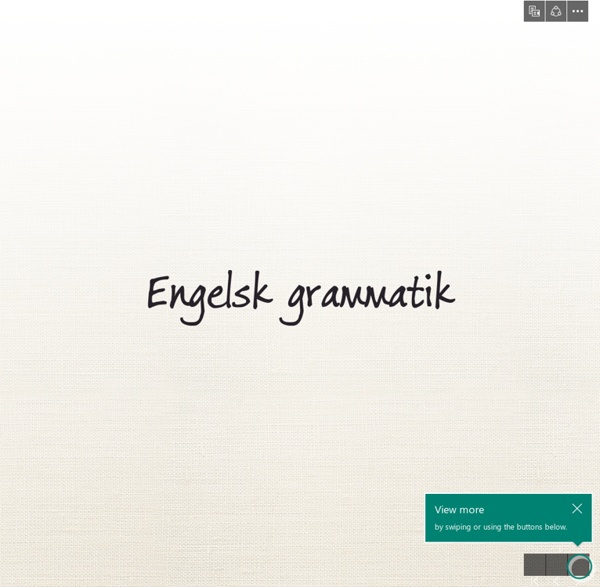



https://sway.com/KvyadeZZFpJK86Ee
Related: Engelska • grammar • Grammar • WebsidorComprehension Tests 7-9 – WebEnglish.se Talk, talk and talk some more Every spring the Swedish schools must arrange National Tests in English for all 9th graders to attend. An essential part of this test is speaking English. The students need to be able to tell something about themselves, their experiences and/or their thoughts, and also to discuss given topics with a… In "Teaching Matters" Spread Inspiration via WebEnglish.se 10 English Phrasal Verbs about Socializing – Espresso English Phrasal Verbs in Conversation Course ask (someone) over If you ask someone over, you invite the person to your house or apartment:
Fun Stuff - How To Train Your Dragon Videos Watch the exciting trailers for the books and films here! Downloads Engage Now - Student Interactions - teacher heath Do you hear your students say things like: "No! That's Wrong!" "What are you talking about?" "Stop being so bossy!" Students Learn MORE when they discover new ideas from each other. BusyTeacher.org We can sort adjectives into several different categories one of them being possessive adjectives - ones that show ownership. There are lots of ways to practicing using possessive adjectives in class. What I’ve put together here are some fun and out of the ordinary games you can use to practice using possessive adjectives with your ESL students. 1Big Foot MatchThis game isn’t for every class, but if yours is fun-loving, they will enjoy this out of the box way to practice possessive adjectives. Have everyone in class remove their shoes and put them in a pile in the center of the room. Mix them up a little bit, and then direct each student to choose two shoes that do not belong to them.
Verb Cards A: ask, add, answer, arrrive B: blow, break, brush, bake, buy, bring, build, borrow, bathe, bite C:color, care, carry, chase, clean, catch, cut, crawl, clap, climb, comb, cry, close, cross, count, cook, cough, collect, choose, change D: draw, drink, dance, drive, drop, dream E: eat, enjoy The 10 Best Places to Find ELT Listening Materials If, like me, you find that one of the most commonly heard requests from your learners is to provide them with additional listening materials to study with outside of class, this post is definitely for you. I’ve trawled the internet and the result of my extensive labors is the list of ten great resources you see below… enjoy! 1) Link Eng Park This site doesn’t actually produce any of its own materials, but it’s as close as an encyclopedia of all ESL online listening materials as you’re ever likely to find. If you can’t find something here for your teaching context, you almost might as well stop searching!
Do Does Did Done The word DO appears a lot in English. This is because it can be a verb TO DO (Do / Does / Did / Done) and can also be an AUXILIARY verb (Do / Does / Did). The Verb - To Do The verb TO DO has four forms. Present Tense: Do / Does Past Tense: Did Past Participle: Done A Brief History of National Grammar Day National Grammar Day, which is celebrated on March 4, was established in 2008 by Martha Brockenbrough, the author of Things That Make Us [Sic] and founder of the Society for the Promotion of Good Grammar (SPOGG). Former President George W. Bush sent a letter commemorating the day in its inaugural year. In an interview with Grammarly last year, Martha explained that she founded the day because she wanted to help her students with their grammar in a lively and positive way. As the National Grammar Day website states, “Language is something to be celebrated, and March 4 is the perfect day to do it. It’s not only a date, it’s an imperative: March forth on March 4 to speak well, write well, and help others do the same!”
Valentine's Day February 14th is traditionally a celebration of love, so how do people in the UK mark the occasion? Cards Sending a Valentine's card to a loved one is a custom that started more than a century ago. Couples give cards to each other, but it is also traditional to send an anonymous card to anyone you secretly love. This practice is particularly common in schools and can be a source of great amusement and embarrassment as everyone tries to work out who sent a card and who has a secret admirer! Valentine's Day symbols on cards include hearts designs, doves, and the figure of the winged angel, Cupid.